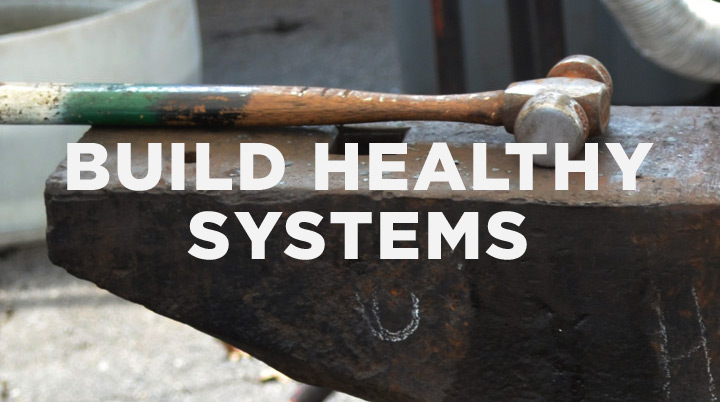Latest
-
Objections to the Christian Faith from the Unchurched and De-Churched
 Tue Dec 02, 2014
Tue Dec 02, 2014
by Resurgence -
Craig Groeschel: We Innovate for Jesus
 Tue Oct 14, 2014
Tue Oct 14, 2014
by Resurgence -
Mark Driscoll: Revelation
 Tue Oct 07, 2014
Tue Oct 07, 2014
by Resurgence -
RESURGENCE LEADERSHIP #034: JOHN PIPER, WHY I TRUST THE SCRIPTURES, PART 2
 Tue Sep 30, 2014
Tue Sep 30, 2014
by Resurgence -
Resurgence Leadership #033: John Piper, Why I Trust the Scriptures, Part 1
 Tue Sep 23, 2014
Tue Sep 23, 2014
by Resurgence

Archives
Are you building healthy systems?

Planters usually begin their planting journey with great intentions.
Their strengths tend to be relationships and their passion is often looking toward Sunday mornings. With certain exceptions (large start-up teams, ideal locations, well funded), churches will not maintain the momentum that most church planters are wanting. Start-up is not easy, but it is often when the church has the most receptivity in the community. Response from open people create a sense of momentum, but that momentum must be transferred to systems. Intentional systems, processes, and cultures are critical to long-term impact in new contemporary churches.
Why do most churches stay small?
My friend Darrin Patrick explains that in an interview we did a while ago. In regards to church planting, I asked him, "Why do most churches stay small?" Darrin replied:
Largely because most pastors don't know how to build systems, structures, and processes that are not contingent upon them. Most pastors can care for people, but don't build systems of care. Most pastors can develop leaders individually, but lack the skill to implement a process of leadership development. When a pastor can't build systems and structures that support ministry, the only people who are cared for or empowered to lead are those who are "near" the pastor or those very close to the pastor. This limits the size of the church to the size of the pastor.
Yet, now it seems that most planters know the importance of creating healthy systems, processes, and cultures. In most cases, their focus is to reach lost and other unchurched people and see the church grow numerically and in spiritual maturity. Nowadays, most planters link a growing church with healthy systems, processes, and cultures. The terms, though different, are often used interchangeably. Let's look at five key considerations when addressing the issues of systems and processes.
1. God's part and our part
Healthy systems, processes, and cultures enable and facilitate growth, but don't cause it. The Apostle Paul explained that we cooperate with God in the planting and watering of the seeds, but that it's God who makes the seeds grow. "I planted, Apollos watered, but God gave the growth" (I Cor. 3:6). Establishing healthy processes, systems, and cultures is part of that cooperation.
2. A fix-it mentality
Most planters tend to ask good questions regarding systems and processes including, "How do we reach more people?" or "How do we keep moving forward?" The answer may include the creation or revising of a system or process, but a narrow focus can lead planters down the wrong path when they conclude, "If we just fix ___________, then we will grow." Issues are often much deeper.
3. Assessing health
Systems, processes, and cultures will emerge from the pre-launch phase. The only question is whether they are healthy or unhealthy. Will they create leverage for growth and momentum, or will they create barriers and obstacles, adding to a planter's stress?
4. Pre-launch behaviors
The pre-natal phase in a mother's womb is vital to an infant's health after birth. The things a mother does and does not do during this time have lasting impacts. Likewise, the things a planter does and does not do during pre-launch phase have lasting impact for years to come. Planters either intentionally create leverage through the establishment of healthy systems, processes, and cultures, or they risk creating barriers and obstacles.
5. Urgency and accountability
When building a new house, most localities require an occupancy permit before a family can move in. A permit guarantees that the basic systems (i.e. water, sewer, electrical, lighting, etc.) are healthy and functioning. There is no equivalent standard or requirement in new churches. As a result, many new churches are birthed with the equivalent of no water, no electricity, and no lights. Basic systems might include disciplemaking, evangelism, leadership development, and volunteer mobilization. The "Tyranny of the Now" and the lack of accountability structures impacts a planter's ability to create healthy processes and systems in three ways:
- Capacity - Everything tends to fall on the planter's shoulders. Although the planter would like to slow down and "do it right," a planter often gets caught in the urgent accepting, living with unhealthy systems. Many planters recognize the dysfunctional cycle, but get stuck in it, further adding to the stress and discouragement.
- Choices - Leaders make daily choices to focus on production or production capacity (in the work or on the work). Sometimes it seems that production never stops, easily consuming all of the planter's time. Sunday to Sunday pressure alone can be overwhelming. Making wise choices is one of the keys to managing the roles. Building healthy systems, processes, and cultures is a function of good strategic planning around available capacity.
- Time - Time is one of a planter's most precious resources. Starting a new church involves hundreds of tasks. Most of these tasks do not involve connecting with lost people or building healthy system. That can be a stretch for a lot of planters and a great source of stress.
Systems, processes, and culture are essential. Sustainability and fruit are almost always advanced when a planter understands that importance.
This content is adapted from Ed Stetzer's site. Head over there for the whole series on "7 Top Issues Church Planters Face."